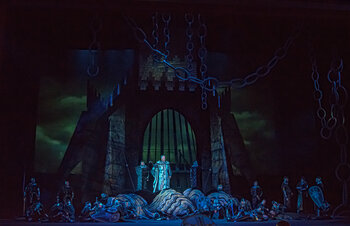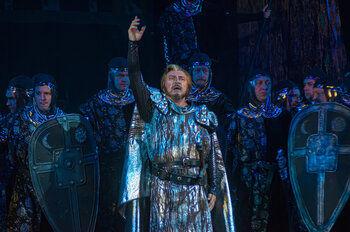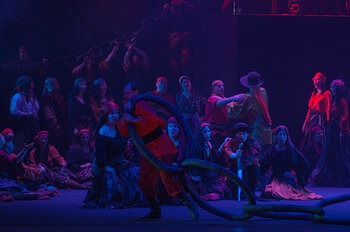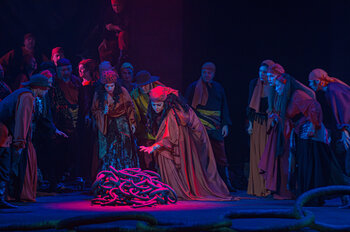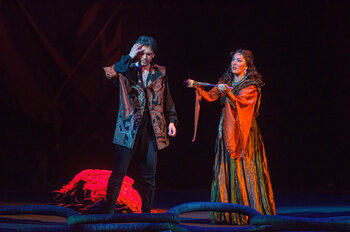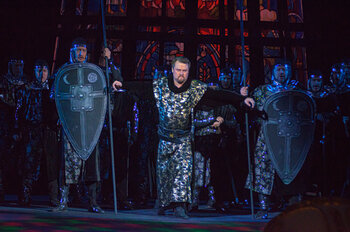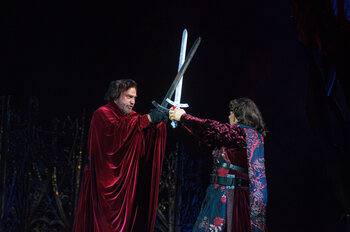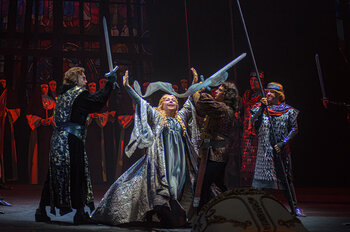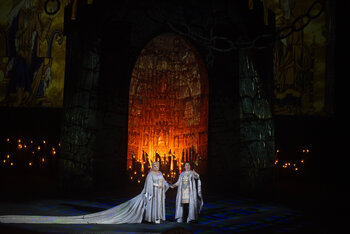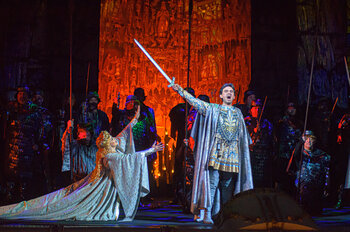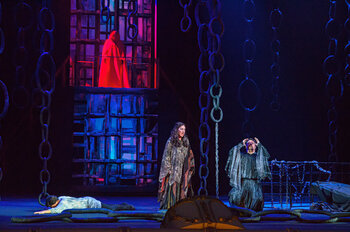Upcoming shows
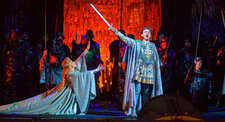
Libretto by S. Cammarano,
assisted by L. Bardare
Act One
Scene One. The Castle of Aliaferia in Saragossa. The Count di Luna’s adherents and guards are waiting for him under the age-old vault. The old Warrior Ferrando is telling about the events that happened in the Count’s family on the days of his youth.
Twenty years ago the late Count had two sons: one they are waiting for now and another younger one, just a baby.
Once their wet-nurse entered a bedchamber and saw an old Gypsy woman at the baby’s cradle. The people made a fuss and drove the uninvited guest out. But since that ominous day the baby began to pine. The blame was put on the Gypsy woman, so she was caught and burnt down. But it was not the end. On the execution day the old witch’s daughter stole into the castle and kidnapped the child. The search was vain, and the baby disappeared with no trace. Just in the ash of the fire that had burnt the witch some child’s bones were found. However the old Count di Luna never believed his younger son’s death. He died leaving a testament that his should find his brother. And the witch… There’s a popular belief that the spirit of the burnt is fluttering around the world as an owl. Once the Count’s servant tried to shoot it but died, finished Ferrando.
Scene Two. Leonora is waiting for the troubadour Manrico in a joyous excitement. She tells her confidant Ines of how she first met her sweetheart at a knight tournament. Since then she hasn’t seen the troubadour for long as they were parted by a war. One night Leonora heard der declaration of love. It was Manrico. Ines cautions Leonora in vain as her heart is given to the troubadour for ever. The Count di Luna appears. He rushes to Leonora’s balcony, but the troubadour’s song makes him stop. Leonora hastens to Manrico. A quarrel breaks out between the rivals. Leonora implores the Count to spare Manrico, but the Count takes out a sword in a burst of jealousy.
Act two
Scene Three. A Gypsy camp in the Biscay mountains. A daybreak. The Gypsy people get down to work with merry songs. Only old Azucena is gloomy. Left tete-a-tete with Manrico, she tells him of how her mother was burnt by order of the old Count di Luna. Azucena wanted to revenge: having kidnapped the Count’s son, she decided to throw him into the same fire. However mad with her grief, she made a terrible mistake burning her own baby. Manrico is utterly astonished. Does it mean that he isn’t Azucena son? The Gypsy calms him. She reminds him of her motherly love and implores to revenge. Azucena hates the Count di Luna: he wanted to kill Manrico, but recently Manrico spared him in a combat. The troubadour himself can’t understand how it happened: he was ready to strike the defeated Count a final blow as some secret voice stopped him. But now he’s going to be merciless. Ruiz tells him that Leonora, wrongly informed of Manrico’s death, has made up her mind to take the Monastic vows. Azucena tries in vain to hold her son as he hastens to Leonora.
Scene Four. The Count di Luna is sure that he’s killed the troubadour. He plans to abduct Leonora from the monastery: nobody is Going to stand between them now. Having seen Leonora, the Count hides. Leonora tenderly bids farewell to Ines. Monastery is better than life without Manrico. She goes to the altar together with nuns. All of sudden, the Count di Luna with his adherents intercept her: instead of a monastery, Leonora will go to marry the Count. Manrico’s appearance stuns everyone. The Count is infuriated as his enemy has resurrected from death. Leonora can’t believe her happy salvation. Ruiz with his warriors hasted to hepl Manrico. The Count di Luna and his adherents have to retreat.
Act Three
Scene Fire. The camp of the Count di Luna. The soldiers are getting prepared to besiege the palace hosting Leonora and Manrico. The Count hopes to part them again. The soldiers bring Azucena tied up: she was caught as a spy. Ferrando recognizes her as the Gypsy who kidnapped the small Count. Azucena calls Manrico in despair. The Count’s joy is boundless: he’s going not only to revenge his brother, but also to punish his most sworn enemy’s mother.
Scene Six. The longawaited moment of Leonora and Manrico marriage is darkened by an alarm: the palace is surrounded by enemies, so a cruel battle is going to take place. The danger doesn’t frighten Manrico, though: Leonora’s love gives strength to him. Agitated Ruiz reports that Azucena has fallen into threatened with death. Manrico is full of resolution. No matter what would happen, he ought to save his mother.
Act Four
Scene Seven. A jall tower in the Count di Luna’s palace. Manrico’s detachment has been beaten. The troubadour is in captivity. Leonora is ready to save her sweetheart at any cost. Ruiz is afraid to leave the girl alone, but Leonora has a reliable protector, a seal-ring with poison. The Count is infuriated: he’s captured the palace, but not Leonora. Tonight he’s going to revenge his failure by executing Azucena and Manrico. In despair Leonora implores the Count to liberate the troubadour, but her supplications just strengthen his fury and jealousy. At last, Leonora makes the final step: she vows to marry di Luna. The Count orders his jail guards to release Manrico. Meanwhile, Leonora drinks her poison.
Scene Eight. Manrico and Azucena are waiting for their death in a gloomy prison. The Gypsy woman is broken down by her sufferings: she has some dreadful visions seeing the fire that burnt her mother. Manrico tender caring calms her. Leonora appears. She’s brought liberty to Manrico: the jail doors are open for the troubadour, but she can’t join him. Manrico passionately reproaches his sweetheart as she’s forgotten her oath. He doesn’t need freedom bought at such a price. Manrico can realize Leonora’s deed only when her poison begins to act. The Count di Luna enters the jail. He’s come to realize all the vanity of his hopes. He orders to execute Manrico. Azucena wakes up. She’s stopping the Count, but too late: the execution has taken place. Then the Gypsy reveals a terrible truth to the Count: he’s killed his own brother. Now she has taken vengeance for her mother.

